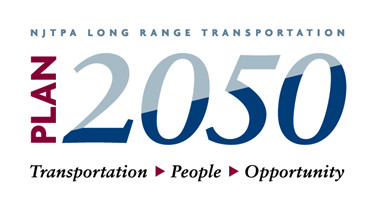July 2020
Posted: 7/20/2020 7:13:54 AM
Members of the NJTPA Board weighed in on priorities for Plan 2050: Transportation, People, Opportunity, the agency’s next Long Range Transportation Plan, at their July 13 meeting. Following a robust public outreach process and plan development, the Board must approve the new plan by Fall 2021 in order for the region to continue to receive federal transportation funding.
The Board’s discussion on turning regional strengths into opportunities followed previous work on the plan at a virtual retreat in June. One key issue identified at that event, and further discussed at the July meeting, was the need for greater equity.
“Recent incidents across our country have again put a spotlight on the racial and economic injustices that still exist today,” Board Chair Kathryn DeFillippo, a Morris County Freeholder, said during her report to the Board. “Equity has long been central to the work of the NJTPA … but we must strive to do more.” Plan 2050 she said was an opportunity to help address this issue.
NJTPA Second Vice Chair John P. Kelly, an Ocean County Freeholder, put development of the plan in context in his report as Chair of the Planning and Economic Development Committee: “While 2050 may seem impossibly far off in the future, we should recognize that projects we conceive today often take years to develop and implement—and the resulting infrastructure can last for decades. … We’re in this for the long game.”
Central Staff led a discussion on five key regional strengths identified at the retreat that offer opportunities for progress: downtowns, diversity and equity, freight, existing transportation networks and technology. Several Board members raised the need to expand and improve public transit options to connect people to employment and other parts of the state. However, it was noted that expanding transit would require addressing funding needs in a realistic and long-term way. Among the transit suggestions were:
- Explore restoring service on former rail lines, such as the West Shore and interurban streetcars
- Improve transit to and from areas in the western part of the region to give people access to jobs
- Expand train service west of Dover to serve Sussex and Warren counties and northeastern Pennsylvania
- Improve intra-state and intercity travel as well as commuting to New York City
- Make transit and other improvements along corridors, such as Newark to Paterson, to help address needs of the region’s minority and low-income communities
- Improve beneficial technology that provides transit information and schedules
Other points raised during the discussion:
- Towns should begin investigating how to reuse some of the extensive parking in downtowns for parks and other purposes, particularly as new technologies reduce dependence on personal vehicles
- Many of the experiments with reusing street space and encouraging walking during the pandemic should be made permanent
- Continued support for subregional planning is needed
- New funding mechanisms such as value-capture and public-private partnerships can underwrite needed transportation improvements
- Continued outreach to the state’s diverse communities is needed to understand needs in the region
- Changing zoning to improve housing options can promote equity in transportation as well
- Public-private partnerships have been valuable in improving rail freight infrastructure, such as addressing height and weight restrictions on rail lines
- Marine highways offer promise for improving freight and freight-related jobs
- Freight rail must be supported to reduce roadway congestion
- Connecting towns through improved trails, biking facilities and bus transit will give residents needed travel options
- Transportation improvement projects can incorporate technologies such as cabling needed for high speed internet
- Universities and others developing advance technologies should be encouraged to develop practical applications for communities
Following the discussion, Central Staff briefed the Board on public outreach plans for Plan 2050, which will include a virtual symposium series, beginning with an event focusing on adapting to change this fall.
Also planned is an advisory committee reflecting the region’s diverse communities and outreach events for the public around the region, with the involvement of the NJTPA’s 15 subregions. The NJTPA’s UpNext young adult advisory group is also providing input for the plan. Visit njtpa.org/Plan2050 to learn more about the long-range plan update.